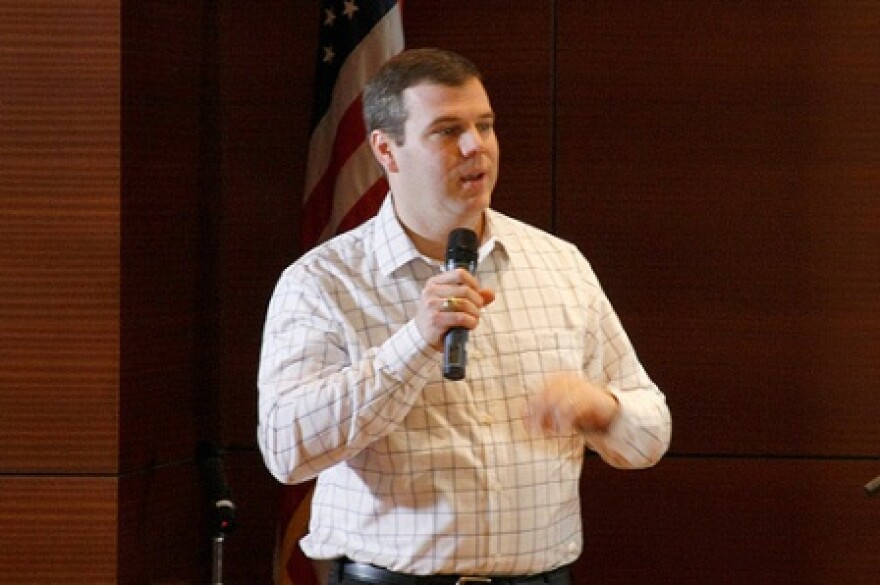By Kayla Regan
http://stream.publicbroadcasting.net/production/mp3/kcur/local-kcur-993888.mp3
Kansas City, Missouri – From spiritual leaders to bloggers, nearly 100 people attended Gigabit City: One Thousand and One Uses for Google Fiber in KC Nov. 10 at the downtown public library. They were there to discuss ideas for what Google Fiber could mean to Kansas City. After a prior brainstorming session, ideas were compiled into Building the Gigabit City, a 126-page report.
The presentation was put on by Brainzooming, a business consulting group that's helping to spearhead the conversation about Google Fiber in Kansas City. They also helped put the report together. Mike Brown, founder of Brainzooming, and Barb Murphey, also of Brainzooming, highlighted a few of the report's ideas, including:
--Record first-person perceptions of public places, like museums, in 3D or hologram form. This would give future generations the ability to see places just as you had.
--Create a digital master school district for Kansas City.
--Aggregate educational materials to allow more options for continuing education.
--Make it easier for patients to share medical information with any number of doctors.
--Share schedules to help coordinate transportation for seniors and people with disabilities.
Google Fiber is a network of fiber-optic cables that make up the fastest internet in the world. It's one gigabit per second, which is 100 times faster than current normal wireless speeds and 20,000 times faster than dial-up.
Area groups are making sure Kansas City is taking Google Fiber seriously. The Gigabit Challenge is giving $100,000 for the best business idea using Google Fiber. The Give Us a Gig initiative will empower neighborhoods to tell the story of how gigabit speeds can benefit them. The Kauffman Foundation's kcgigideas.com lets individuals post ideas on their website and vote on other's ideas. Among the most popular ideas right now are:
--Making an e-community center for the Rosedale area.
--Turning an abandoned school into a computer lab and web school.
--Putting life-size high resolution screens in places like parks, allowing you to interact with someone in another park across the world.
Part of the reason for confusion about Google Fiber is that no one really knows what this kind of super-fast Internet can do. Aaron Deacon is events chairperson of the Social Media Club of Kansas City, which also helped put on the presentation. He says a little mystery is involved with putting in any new infrastructure.
"When you build highways or when you build railroad tracks, you don't know what's going to happen around that infrastructure until it's in place," Deacon says. "Kansas City is not alone in having a group of citizens who have no idea what gigabit speed could mean in their lives. Nobody knows."
One of the most discussed potential applications of Google Fiber seems to be streaming video in high definition. Although most people can already stream video, Google Fiber will supposedly make the experience way better. It could be used in the classroom, for telemedicine or broadcasting concerts or sports events. Cameron Cushman is leading the Kauffman Foundation's efforts to help build new businesses with Google Fiber. Cushman says Google Fiber definitely doesn't stop with streaming.
"To narrow it down to one or two, or even five or ten different things, that should be the best use of Google fiber, I think is not only impossible, but also a little short-sighted," Cushman says. "I think we should let a lot of ideas float out there."
Cushman says a lot of the confusion is because of Google itself. The company is still figuring out the logistics of wiring both Kansas City, Kan., and Kansas City, Mo. It's never done this before. One of the biggest issues Google has reported so far is access. A lot of people in Kansas City don't have wireless internet access as it is. How will the city make sure all segments of the community will be able to use the technology? How much will Google Fiber cost? Google says its service will be fairly and competitively priced, but already there are rumors of various bundling packages. Cushman says they still don't have the answers.
"If you don't have Internet now and you don't have the funds to buy it now, what makes you think that any of those people will be able to afford buying high speed internet for their home?" he asked.
Cushman says Google Fiber is working with the city to provide access in public areas like libraries and schools. He said that Google Fiber's potential to turn Kansas City into an economic, cultural and technological hub depends on whether the city takes advantage of it.
"If people do not use ideas then no value is created. If we don't take these ideas and do something with them they're just going to go away and nothing is going to happen," Cushman says. "So, the value of an idea is in the using for it."
Google plans to have the fiber technology available in Kansas City beginning early 2012.
This story was produced for KC Currents. To listen on your own schedule, subscribe to the KC Currents Podcast.


